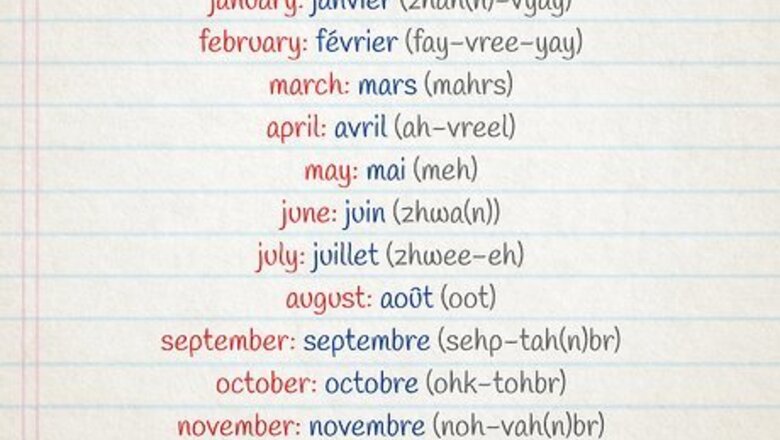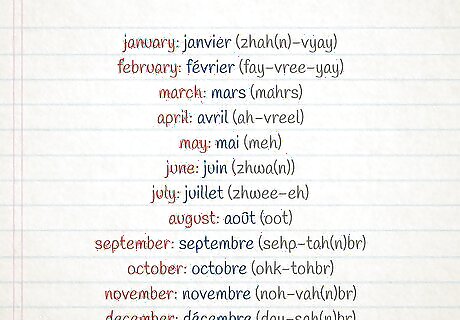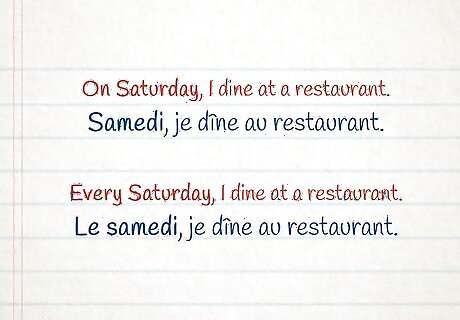
views
Writing and Pronouncing Dates in French

Learn the names of the months. The French names are written above in italic, with the French pronunciation following in parentheses. An (n) in parentheses represents a nasalized "n." January: janvier (zhah(n)-vyay) February: février (fay-vree-yay) March: mars (mahrs) April: avril (ah-vreel) May: mai (meh) June: juin (zhwa(n)) July: juillet (zhwee-eh) August: août (oot) September: septembre (sehp-tah(n)br) October: octobre (ohk-tohbr) November: novembre (noh-vah(n)br) December: décembre (day-sah(n)br)

Learn how to write the date. In French, the date is written in "day month year" order, with no commas separating each term. Note that the month is not capitalized. Here are a couple examples (plus the abbreviated version): 4 août 1789 (4/8/1789) 15 mars 2015 (15/3/2015)

Say the date out loud. To read the date out loud, add le to the beginning of the date, and read all dates as cardinal numbers ("five" instead of "fifth"). Here are the previous examples written as you would say them. Study how to count in French if you are not familiar with reading French numbers: "le quatre août mille sept cent quatre-vingt-neuf" "le quinze mars deux mille quatorze" Every month is a masculine noun, so the article used is always le.

Learn the exception for the first of the month. When talking about the first day of the month, use "1er" in writing, and say "premier" when speaking aloud. This is the only date that uses ordinal numbers ("first") instead of cardinal ("one"). For example: 1er avril (1/4), spoken "le premier avril"
Writing and Pronouncing the Days of the Week

Learn the days of the week. Refer to the list above to learn the days of the week in French, along with how they are pronounced. Note that the days of the week are not capitalized in French. Monday: lundi (luh(n)-dee) Tuesday: mardi (mahr-dee) Wednesday: mercredi (mehr-kruh-dee) Thursday: jeudi (zhuh-dee) Friday: vendredi (vah(n)-druh-dee) Saturday: samedi (sahm-dee) Sunday: dimanche (dee-mah(n)sh)

Write and pronounce the date, including the day of the week. This is identical to writing the date, with the day of the week added to the front of the phrase. Here's an example: English: Wednesday, the 5th of June French (written): mercredi, le 5 juin 2001 (formal) French (written): mercredi 5 juin 2001 (normal) French (spoken): mercredi cinq juin deux mille un French (spoken): le mercredi cinq juin deux mille un (eventually if you want to describe a precise day)

Know when to use articles. Every day of the week is a masculine noun, so the article le is used. For example, "Le samedi est le sixième jour." means "Saturday is the sixth day." However, when you are talking about an event that occurred on a specific day, know the difference between le samedi and samedi: Samedi, je dîne au restaurant. = On Saturday, I dine at a restaurant. (A single event.) Le samedi, je dîne au restaurant. = Every Saturday, I dine at a restaurant. (A repeated event.)
Using Dates in Phrases

Ask for today's date. Ask someone today's date by saying or writing Quelle est la date aujourd’hui? Aujourd'hui means "today." Optionally, you can use d'aujourd'hui ("of today") to use the word as a noun instead of an adverb. Both are widely used.

Ask for the day of the week. To ask for the day of the week, say Quel jour sommes-nous aujourd’hui? or Quel jour est-on aujourd’hui?

State today's date in a sentence. If someone asks you one of the above questions, be prepared to answer: To answer with "Today is Monday, November 15th," write Aujourd'hui, c'est le lundi 15 novembre. To answer "Today is Sunday," say Aujourd'hui, c'est dimanche. or simply C'est dimanche.

Use the preposition en. Use this word to write "in July" (en juillet), "in 1950" (en 1950), "in April 2011" (en avril 2011), and so forth. This phrase can go at the front or the end of a sentence. For example: J’ai un rendez-vous chez le médecin en mars. = I have an appointment with the doctor in March. J'ai vécu à Paris en 1990. = I lived in Paris in 1990.




















Comments
0 comment